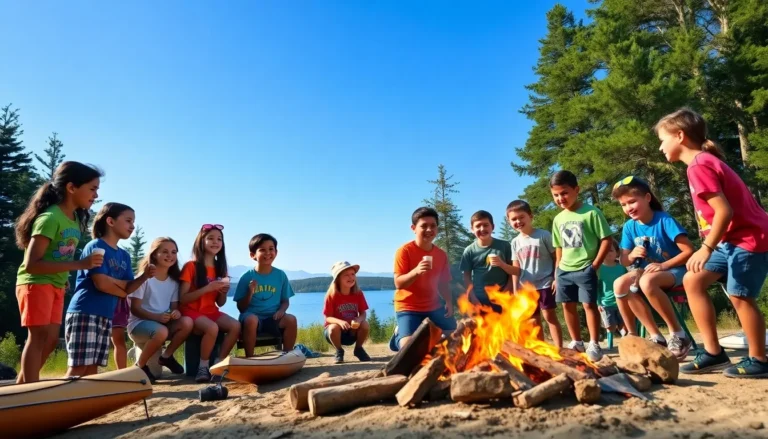Looking for an exciting way to transform your child’s summer break into a high-tech adventure? Robotics summer camps are becoming the hottest trend in educational entertainment combining STEM learning with hands-on fun. These innovative programs let kids dive into the fascinating world of robots while making new friends and developing valuable skills.
From building their first robot to programming advanced movements robotics camps offer an incredible opportunity for young minds to explore engineering mechanics and coding. Whether your child’s a complete beginner or a budding tech genius there’s a perfect program waiting nearby. With experienced instructors state-of-the-art equipment and engaging projects these camps create an environment where creativity meets cutting-edge technology.
Table of Contents
ToggleBenefits of Robotics Summer Camps for Kids
Robotics summer camps offer transformative learning experiences that combine technological education with practical skill development. These specialized programs create an environment where children explore robotics through structured activities designed to maximize their learning potential.
Building STEM Skills Through Hands-on Learning
Robotics camps incorporate interactive STEM activities that engage participants in real-world engineering challenges. Students learn core programming concepts through direct interaction with robots including Arduino boards CircuitBoards electronic components. Camp activities integrate mathematics physics concepts through practical applications like calculating robot movement speeds measuring sensor distances coding algorithms. Participants gain exposure to computer-aided design (CAD) software to create 3D-printed robot parts custom components. The hands-on approach reinforces fundamental scientific principles as children observe immediate results of their programming decisions mechanical adjustments.
Developing Problem-Solving Abilities
Robotics camps cultivate analytical thinking through structured challenges design projects. Students learn to break down complex tasks into manageable steps identify solutions to technical obstacles calibrate robot responses. The debugging process teaches systematic approaches to problem identification testing multiple solutions evaluating results. Children develop critical thinking skills by experimenting with different programming sequences mechanical configurations optimal solutions. Group projects encourage collaborative problem-solving as teams work together to overcome technical challenges share knowledge resources reach common goals.
What to Look for in a Local Robotics Camp
A high-quality robotics camp delivers structured learning experiences tailored to participants’ developmental stages. These essential factors ensure children receive appropriate instruction and engage with suitable technology.
Age-Appropriate Programs
Local robotics camps segment programs into specific age groups: 6-8 years, 9-12 years, and 13-16 years. Elementary-level programs focus on basic robotics using kid-friendly platforms like LEGO WeDo or Dash & Dot. Middle school programs incorporate intermediate concepts through LEGO Mindstorms EV3 or VEX IQ systems. Advanced programs for teens utilize professional-grade equipment including Arduino microcontrollers ROS programming interfaces. Each level features:
- Age-specific teaching methods incorporating visual audio kinesthetic learning
- Developmentally appropriate challenges matching cognitive abilities
- Equipment sized for different motor skill levels
- Social activities promoting peer collaboration
- Project complexity aligned with grade-level standards
Qualified Instructors and Staff
Expert instructors bring technical expertise educational backgrounds to robotics camps. Lead teachers hold degrees in engineering computer science or related STEM fields. Supporting staff maintain certifications in:
- Youth development programming
- First aid CPR safety protocols
- Educational technology integration
- Project-based learning methods
- Robotics competition coaching
- Lead robotics instructor
- Programming specialist
- Safety supervisor
- Student mentors from competitive robotics teams
Popular Robotics Camp Activities
Robotics summer camps offer diverse hands-on activities that combine technical skills with creative problem-solving. Each activity emphasizes practical learning through direct interaction with robotics technology.
Robot Building and Programming
Students assemble robots using specialized kits containing motors, sensors, circuit boards, structural components. Programming sessions teach fundamental coding concepts through platforms like Scratch, Python or Arduino IDE. Campers learn to write code that controls robot movements, sensor responses, automated functions. Advanced groups work with complex features such as computer vision systems for object detection or autonomous navigation capabilities. The building process incorporates engineering principles including mechanical design, electrical connections, component integration.
Group Challenges and Competitions
Teams compete in robotics challenges designed to test technical skills, strategy, collaboration. Popular contest formats include:
- Sumo wrestling matches where robots push opponents out of a circular ring
- Maze navigation races testing autonomous movement programming
- Search-rescue missions requiring robots to locate specific objects
- Design competitions focused on creative solutions to engineering problems
- Build battles evaluating construction speed, stability, functionality
Participants rotate through different team roles: programmer, builder, strategist, documentation specialist. Daily tournaments create opportunities to refine designs, optimize code, improve teamwork approaches based on competition results.
| Competition Type | Skills Developed | Team Size |
|---|---|---|
| Sumo Wrestling | Strategy, Programming | 2-3 |
| Maze Navigation | Sensors, Algorithms | 3-4 |
| Search & Rescue | Problem-solving, Controls | 4-5 |
| Design Challenges | Innovation, Engineering | 2-4 |
| Build Battles | Speed, Efficiency | 3-4 |
Finding the Right Camp Location
Selecting an ideal robotics camp location involves evaluating accessibility balanced with program quality. Local camps provide convenient learning opportunities while maintaining established daily routines.
Day Camps vs Residential Options
Day camps operate from 9 AM to 4 PM across 5-day sessions, enabling students to return home each evening. These programs cost $300-$500 per week including equipment access. Residential camps span 1-2 weeks with overnight stays, ranging from $800-$1500 per session. Day camps suit families within 30 minutes of travel time while residential options accommodate participants from broader geographic areas. Local day programs integrate seamlessly with family schedules through flexible drop-off times between 8-9 AM. Overnight camps feature extended programming with evening activities like robotics film screenings team challenges.
Transportation Considerations
Most robotics camps offer multiple transportation options to ensure safe reliable access. Direct parent drop-off zones include designated 15-minute parking areas supervised staff. Organized shuttle services run from central community locations like libraries schools with morning pickup times at 7:45 AM 8:15 AM. Carpooling networks connect families from similar neighborhoods through camp-managed coordination systems. Public transit accessibility factors into site selection with many facilities located within walking distance of bus metro stops. Transportation fees range from $50-$75 weekly for shuttle service while carpools operate through parent volunteer systems.
Cost and Registration Details
Robotics summer camps offer flexible payment structures to accommodate various budgets while providing high-quality STEM education experiences.
Program Fees and Payment Plans
Standard weekly rates for robotics day camps range from $300 to $500 per participant. Residential programs with overnight accommodations cost between $800 to $1,500 for 1-2 week sessions. Programs include:
- Basic day camp package: $300-$350 (materials + instruction)
- Advanced robotics track: $400-$450 (specialized equipment + advanced programming)
- Elite residential program: $1,200-$1,500 (accommodation + meals + extended programming)
Payment options include:
- Monthly installment plans (3-6 months)
- Credit card payments
- Electronic fund transfers
- Financial aid programs for qualifying families
Early Bird Registration Benefits
Early registration periods open 6 months before camp sessions start offering substantial savings:
- 20% discount on tuition when registering 6 months in advance
- 15% discount for 4-month advance registration
- 10% discount for 3-month advance registration
Additional early bird perks include:
- Priority choice of session dates
- Free robotics starter kit ($75 value)
- Exclusive access to pre-camp online tutorials
- Guaranteed placement in preferred skill level groups
- Sibling discounts (additional 5% off per child)
Preparing Your Child for Robotics Camp
Proper preparation enhances a child’s robotics camp experience through organized materials and foundational knowledge. The following sections outline essential items and basic concepts to review before camp begins.
Required Materials and Equipment
Every robotics camp participant needs a dedicated backpack containing specific items for daily activities:
- Safety goggles meeting ANSI Z87.1 standards for eye protection
- Laptop with minimum 8GB RAM running Windows 10 or macOS Catalina
- USB flash drive (16GB minimum) for project storage
- Scientific calculator with basic trigonometric functions
- Notebook with graph paper sections
- Writing tools including pencils markers erasers
- Closed-toe shoes with non-slip soles
- Reusable water bottle labeled with name
- Lunch box with non-perishable snacks
- Personal hand sanitizer portable size
Basic Skills to Review
Students gain more from robotics camp when familiar with these fundamental concepts:
- Basic arithmetic operations including fractions decimals percentages
- Simple geometric shapes measurements angles
- Computer mouse keyboard navigation skills
- File management creating saving moving folders
- Typing speed minimum 15 words per minute
- Block-based programming concepts using Scratch
- Following step-by-step written instructions
- Basic tool identification screwdrivers pliers rulers
- Team communication sharing taking turns
- Problem-solving breaking tasks into smaller steps
Each skill connects directly to camp activities from robot assembly to coding challenges. Parents receive specific skill checklists based on their child’s enrolled program level.
Conclusion
Robotics summer camps offer an unparalleled opportunity for young minds to explore technology while developing crucial life skills. These programs create the perfect environment for children to dive into STEM education through hands-on experiences with robots building programming and problem-solving.
Parents looking for local robotics camps will find options to match their child’s age skill level and schedule. Whether choosing a day camp or residential program they’ll discover a structured learning environment that combines technical education with social development.
The investment in a robotics summer camp extends far beyond the season as children gain valuable skills that’ll serve them well in our increasingly tech-driven world. It’s an experience that sparks curiosity builds confidence and may even inspire future career paths in technology and engineering.






